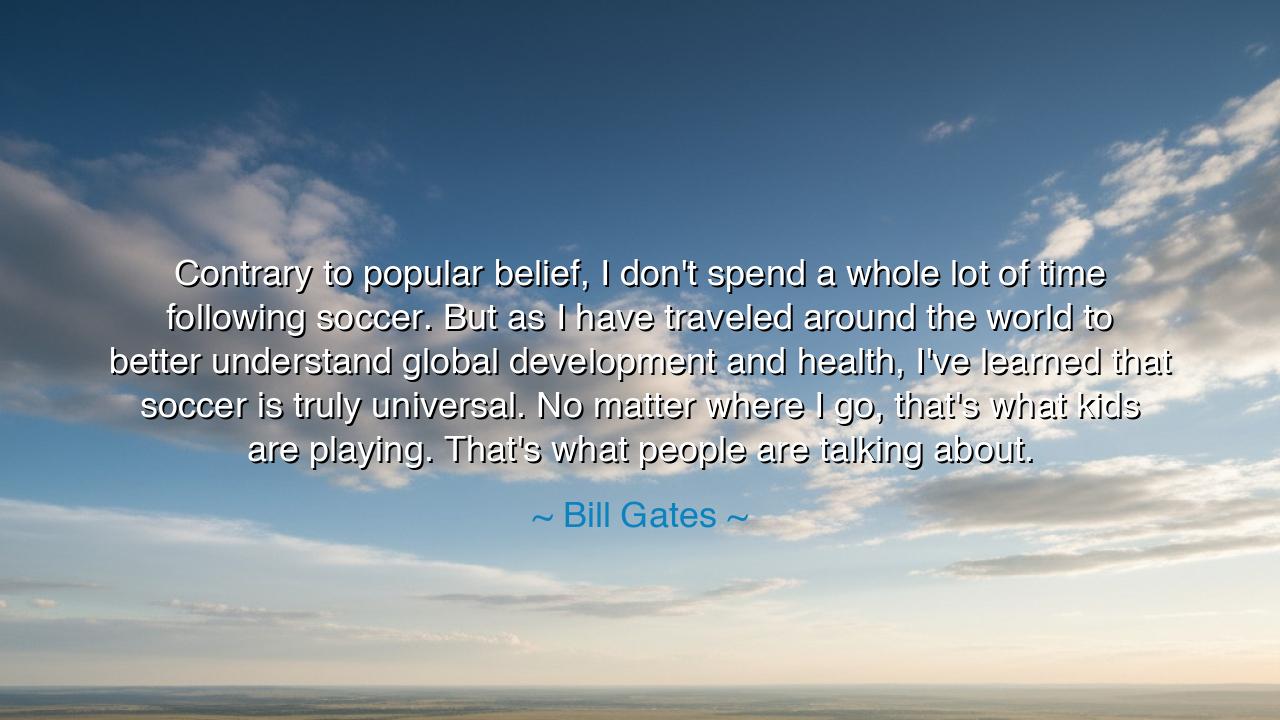
Contrary to popular belief, I don't spend a whole lot of time
Contrary to popular belief, I don't spend a whole lot of time following soccer. But as I have traveled around the world to better understand global development and health, I've learned that soccer is truly universal. No matter where I go, that's what kids are playing. That's what people are talking about.






In the words of Bill Gates, spoken with humility and insight, we find a truth both simple and profound: “Contrary to popular belief, I don't spend a whole lot of time following soccer. But as I have traveled around the world to better understand global development and health, I've learned that soccer is truly universal. No matter where I go, that's what kids are playing. That's what people are talking about.” Though he speaks of a game, what he truly describes is the unity of humankind — a common language spoken not through words, but through movement, joy, and the spirit of play. In this quote, soccer becomes a symbol of shared humanity, transcending nation, wealth, and creed, binding the hearts of millions under one sky.
The meaning of this quote lies in its revelation that connection often arises not from complexity, but from simplicity. Gates, a man known for his command of technology and intellect, turns his gaze toward the most ordinary and joyous of human activities — a ball rolling across a dusty field. What he sees is not a sport, but a phenomenon that unites the world. In every village and city, whether among the towers of Tokyo or the plains of Tanzania, he sees children chasing the same dream. They have no need for translation, for soccer speaks in the universal language of passion, teamwork, and hope. Gates’s discovery is not of the game itself, but of the human truth it reveals: that no matter how divided we appear, there remain sacred things that bind us together.
The origin of this reflection is rooted in Gates’s journey as a humanitarian and global thinker. In his travels through regions struggling with poverty, disease, and inequality, he sought to understand the conditions that shape human life. Yet amidst the statistics and the science, he found something deeper — the indomitable spirit of people who, despite hardship, found joy in the simple act of play. In a child’s laughter echoing over a handmade ball, he saw the resilience of the human heart. In the conversations that followed a match, he saw how communities built bridges through shared love and competition. Thus, the founder of one of the world’s greatest technological empires came to honor a truth older and more enduring than any innovation: that joy is not a privilege of the few, but a birthright of all.
History, too, speaks of the power of this universal game. During the dark winter of 1914, when the guns of World War I fell silent for a single day, soldiers from opposing trenches laid down their arms and met upon the frozen fields to play soccer. For that brief moment, the world remembered its shared humanity. Enemies became teammates; bullets were replaced by laughter; war yielded to the rhythm of a game. That story, like Gates’s reflection, stands as a reminder that even in the midst of division and despair, there exists a thread — simple, human, and indestructible — that can bind hearts where politics and power have failed.
Gates’s insight also carries a lesson for our modern world. In an era of technology and isolation, where people are often separated by screens and circumstance, the universality of soccer reminds us of what we have forgotten: the value of presence, community, and shared experience. A game that needs no words, no wealth, and no privilege — only a ball and open space — teaches us humility. It reminds us that connection is not built through devices, but through the timeless rhythm of human interaction. It is the same principle that Gates himself has sought to apply in his work on global health and education — that progress begins with understanding, and understanding begins with empathy.
And yet, the image of children playing soccer is not only one of unity but of hope. For those living in hardship, the game is a glimpse of possibility — a space where every child, regardless of class or circumstance, can dream freely. Gates, who has dedicated his life to fighting inequality, recognizes that this universality of joy is as important as medicine or education. It is a reminder that to heal humanity, one must nurture not only the body, but the soul. The ball, kicked between friends, becomes more than a game — it becomes a symbol of freedom, of agency, and of shared purpose.
Thus, O listener, take heed of the wisdom in Gates’s words. Look for what unites, not what divides. Seek the simple joys that remind us of our common humanity. Whether through soccer, music, art, or conversation, remember that the bridges we build in play can outlast those built in ambition. The lesson is clear: greatness lies not only in invention or intellect, but in the recognition that joy and compassion are the true foundations of civilization. So, go forth — play, connect, and remember that no matter how far apart we stand in wealth or wisdom, the human heart still beats to the same rhythm, and the world still gathers around the same game.
For in the dust of a village or beneath the lights of a grand stadium, every kick of the ball whispers the same ancient truth: that we are, and have always been, one people under one sky — bound not by borders, but by the shared dream of being alive together.






AAdministratorAdministrator
Welcome, honored guests. Please leave a comment, we will respond soon